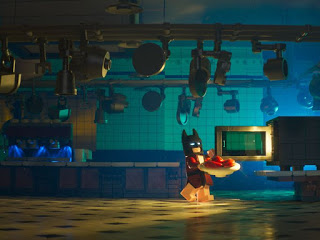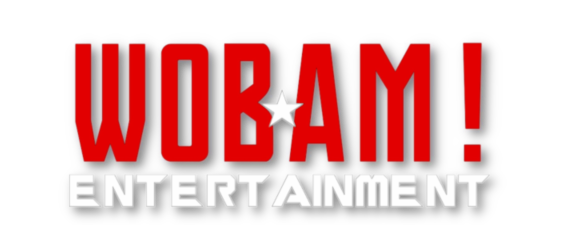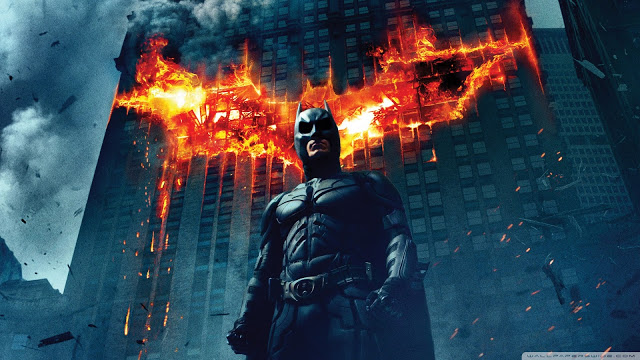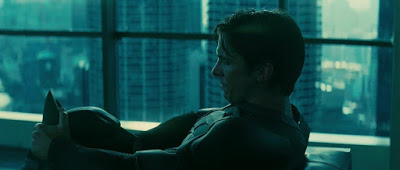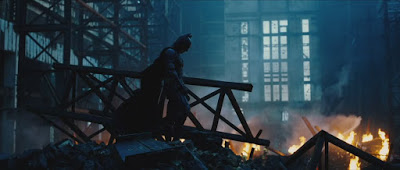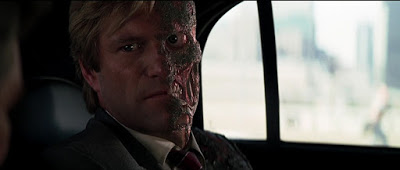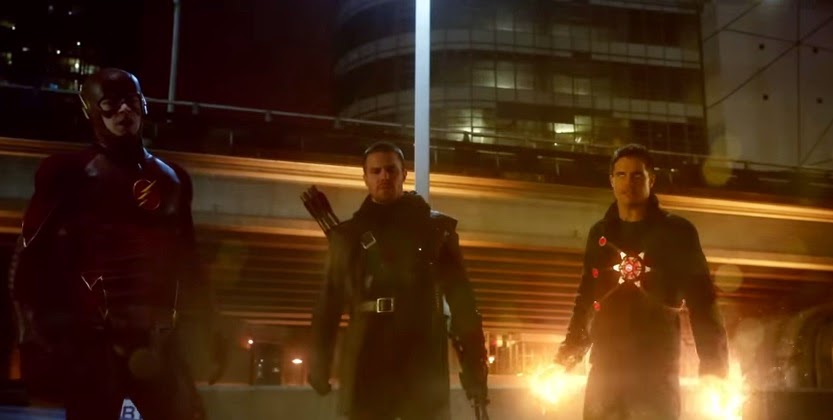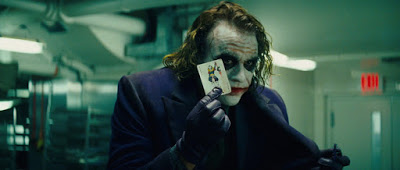
Review: THE DARK KNIGHT
After successfully reviving the Batman franchise with the spectacular Batman Begins in 2005, director Christopher Nolan returned to helm the sequel, simply titled The Dark Knight. While expectations were high, few anticipated he would deliver the transcendent masterpiece The Dark Knight is widely and rightfully recognized as.
Free of the origin story shackles placed on Begins, TDK is able to fully examine the impact of Batman’s appearance as the savior of Gotham City. Bruce’s stated mission to inspire the people of Gotham to stand up the criminals destroying it from the inside out is working, though not entirely in the ways he intended. While the legal system is beginning to turn on the once undefeatable mob families of Gotham, several citizens have been taking up arms and acting as vigilantes or “Batman Wannabes”. Furthermore, Gordon’s warnings (voiced at the end of Begins) about the escalation of crime Batman’s arrival would bring prove horrifyingly true when a madman known as The Joker arrives in town, intent on turning Gotham into his personal playground of chaos while becoming enamored with Batman in the process. On a more personal note, it becomes clear Bruce sees Batman as temporary; over the course of the film, now that he has steered Gotham onto a path to healing, he begins planning to hang up the cowl and leave Gotham in the hands of its “true” heroes, such as District Attorney Harvey Dent. However, matters outside of his control force Bruce to continue his nights of vigilantism, and by the end of the film, it is unclear if he can ever stop being the Batman.
Given Bruce’s desire for a normal life which his mission as Batman prevents him from living, it fits that several shots in the film convey a sense of loneliness and isolation. The shot displayed above is a particularly excellent example, given it takes place almost immediately after Bruce has failed to save both Harvey Dent, who he believed could finish the work of restoring Gotham he started, and Rachel Dawes, the woman he wanted to spend his post-Batman life with. Batman’s isolation from the world at large is another area where The Joker serves as a foil to him, and indeed is what draws The Joker to Batman in the first place. Batman & The Joker are both “freaks”, as described repeatedly during the film, despite existing at opposite ends of the moral spectrum. Due to this shared status, in addition to Batman’s ability to match wits with him and his refusal to be morally corrupted by killing him, The Joker sees in Batman the worthy adversary he has been searching for. Indeed, The Joker explicitly states Batman “completes him”, describes a potential life without the dark knight at his throat as “boring” and caps off his screentime with a declaration that “You (Batman) and I are destined to do this forever”.
Another theme explored in The Dark Knight is corruption, particularly on a moral level. This element of the film is embodied by two characters; The Joker and Harvey Dent, the latter of whom prophetically states early in the film “You either die a hero or live long enough to see yourself become the villain”. The Joker can be seen as a personification of corruption; as a man with no apparent moral code, his overarching goal throughout the film is to bring Gotham city at large down to his level, as part of a “social thesis” stating morality is hypocritical nonsense and that anyone can become as bad as him, if put in the proper circumstances. While he fails to break Batman and a portion of Gotham’s people in such a manner, he succeeds with “white knight” Harvey Dent. Having lost the woman he loved and having his face irreparably scarred in the process, Dent succumbs to madness after a talk with The Joker about the nature of chaos, vowing revenge on those whose actions led to his pain. The theme of corruption complements the film’s subtext on the atmosphere of post-9/11 America. Namely, the US government’s tendency to act in legally and ethically questionable manners in the name of national security, something echoed in the third act of TDK when Batman uses what is essentially a large-scale phone-tapping device to locate The Joker.
- The WOBAM BEACON Newsletter – May 31st, 2021 – Hops & Otaku Double Slices at The Movies - May 31, 2021
- The WOBAM BEACON Newsletter – April 26th, 2021 – MORE Podcasts, Mortal Kombat, and Captain America! - April 26, 2021
- The WOBAM BEACON Newsletter – March 31st, 2021 – “Not Us United” - March 31, 2021
